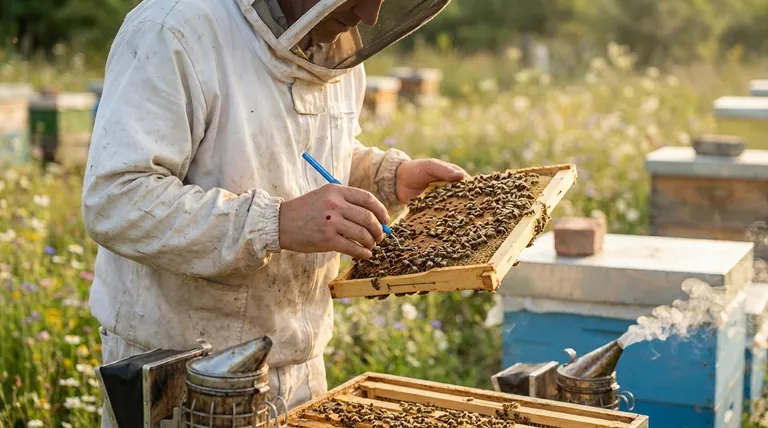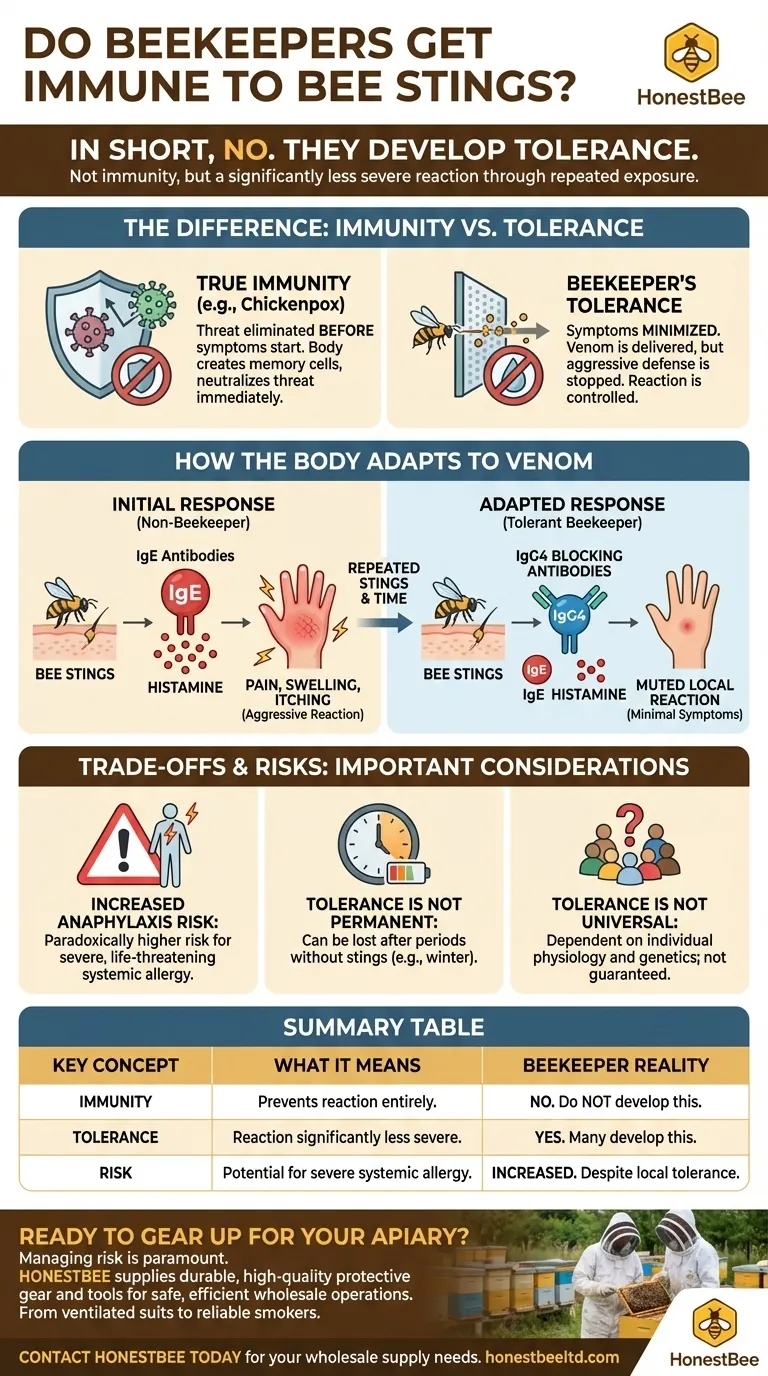In short, no. Beekeepers do not become truly "immune" to bee stings in the way one becomes immune to a virus. Instead, through repeated exposure, many experienced beekeepers develop a high level of tolerance, where their body's reaction to the venom becomes significantly less severe.
The core difference is between preventing a reaction and simply reducing it. True immunity would mean the bee venom has no effect, while tolerance means the beekeeper’s body has learned to stop launching a painful, inflammatory defense against it.

The Difference Between Immunity and Tolerance
To understand what happens to a beekeeper, we must first distinguish between two very different responses from our immune system.
What True Immunity Means
Think of immunity to a disease like chickenpox. After the first infection, your body creates memory cells. The next time you are exposed to the virus, these cells immediately recognize and neutralize it, preventing you from getting sick at all. The threat is eliminated before symptoms can start.
What Beekeeper's Tolerance Means
A beekeeper’s tolerance is different. The sting still delivers venom, and the body still recognizes it. However, the immune system's response changes from an aggressive, inflammatory reaction (large, painful swelling) to a much more controlled and muted one. The symptoms are minimized, but the initial event still occurs.
How the Body Adapts to Bee Venom
This shift from a painful reaction to quiet tolerance is a fascinating immunological process, similar to the principles behind allergy shots (venom immunotherapy).
The Initial Allergic Response
For a non-beekeeper, a sting triggers a classic local allergic reaction. The immune system releases histamine and other inflammatory chemicals at the site, causing the signature pain, itching, redness, and significant swelling that can last for days.
A Shift in Antibody Production
With regular, repeated stings, the immune system of some beekeepers begins to adapt. It gradually shifts its production from IgE antibodies, which are responsible for triggering the allergic reaction, to IgG4 antibodies, often called "blocking antibodies."
These IgG4 antibodies intercept the venom components and neutralize them before they can bind to the IgE on mast cells. This effectively prevents the massive release of histamine that causes the worst symptoms.
The Result: A Muted Local Reaction
For a tolerant beekeeper, a sting that would cause a non-beekeeper's hand to swell to twice its size might only result in a small red dot. There may be a moment of sharp pain from the physical puncture, but the subsequent throbbing, itching, and swelling are dramatically reduced or absent altogether.
Understanding the Trade-offs and Risks
Developing tolerance is not a guaranteed or risk-free process. In fact, beekeepers are in a unique risk category.
The Increased Risk of Anaphylaxis
Paradoxically, while beekeepers can become tolerant to local reactions, their constant exposure places them at a higher risk than the general population for developing a severe, systemic allergy (anaphylaxis). This is a life-threatening condition that requires immediate medical attention.
Tolerance is Not Permanent
A beekeeper's tolerance can be lost. This often happens after a long period without any stings, such as over the winter. The first sting of the new season can sometimes produce a much stronger reaction as the body's "blocking" IgG4 antibody levels have declined.
Tolerance is Not Universal
Not every beekeeper develops a high level of tolerance. Some individuals continue to experience significant local reactions for their entire beekeeping career. The response is highly dependent on an individual's unique physiology and genetics.
How to Apply This to Your Goal
Understanding this process is key, whether you are a beekeeper or are simply curious about the biology.
- If your primary focus is becoming a beekeeper: Understand that developing tolerance is a slow process that is not guaranteed, and you must always be prepared for both local reactions and the possibility of a severe allergy developing.
- If your primary focus is being a long-term beekeeper: Do not become complacent with your tolerance. Be aware that it can change, and always have a plan for how to handle a severe reaction.
- If your primary focus is scientific understanding: Recognize that a beekeeper's muted response is a powerful example of immunological adaptation, not a superpower or a sign of true immunity.
Ultimately, the body's ability to adapt to bee venom showcases a remarkable, yet unpredictable, balancing act between defense and overreaction.
Summary Table:
| Key Concept | What It Means for Beekeepers |
|---|---|
| Immunity | The body prevents a reaction entirely. Beekeepers do NOT develop this. |
| Tolerance | The body's reaction becomes significantly less severe. This is what many beekeepers develop. |
| Risk | Increased risk of a severe systemic allergy (anaphylaxis) despite local tolerance. |
Ready to Gear Up for Your Apiary?
As a beekeeper, managing your risk and protecting yourself is paramount. At HONESTBEE, we supply commercial apiaries and beekeeping equipment distributors with the durable, high-quality protective gear and tools needed for safe and efficient operations.
Let us help you be prepared. From ventilated bee suits to reliable smokers, our wholesale-focused operations ensure you get the professional equipment your business depends on.
Contact HONESTBEE today to discuss your wholesale supply needs and build a safer, more productive beekeeping enterprise.
Visual Guide

Related Products
- Stainless Steel Queen Grafting Tool for Beekeeping and Bee Queen Grafting
- Extra Wide Stainless Steel Honey Uncapping Fork with Scraper Beekeeping Tool
- Professional Stainless Steel J-Hook Hive Tool
- Professional Stainless Steel Frame Cleaner with Ergonomic Wood Handle
- Professional Frame Preparation: The HONESTBEE Electric Wire Embedder
People Also Ask
- What is the purpose of using grafting tools in queen rearing? Mastering Precision Transfer for High-Quality Breeding
- What is the ideal age and appearance of larvae for grafting to produce the best queens? Master the 4-20 Hour Window
- What are the steps involved in using a queen grafting tool? A Guide to Successful Queen Rearing
- What is the role of the high-precision grafting needle in queen rearing? Boost Acceptance with Expert Larval Transfer
- What are the advantages of larval grafting for organic queen rearing? Boost Resilience & Reduce Colony Loss



















